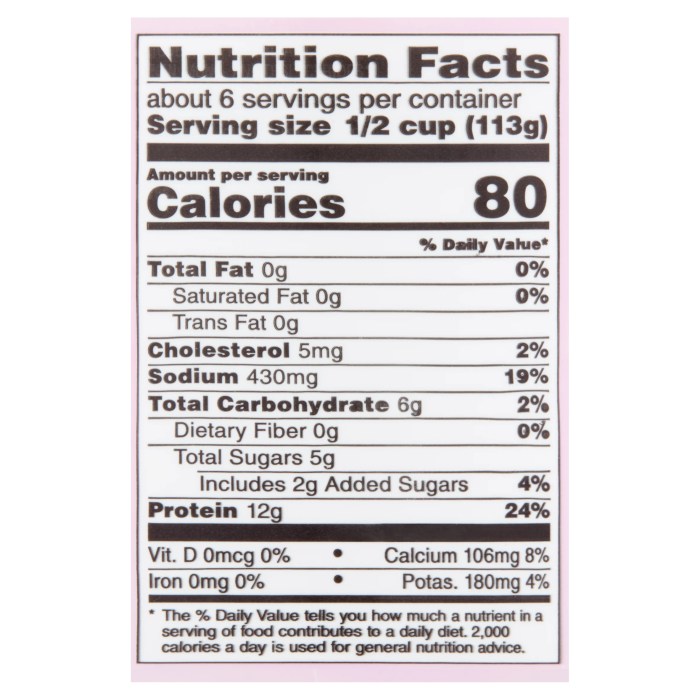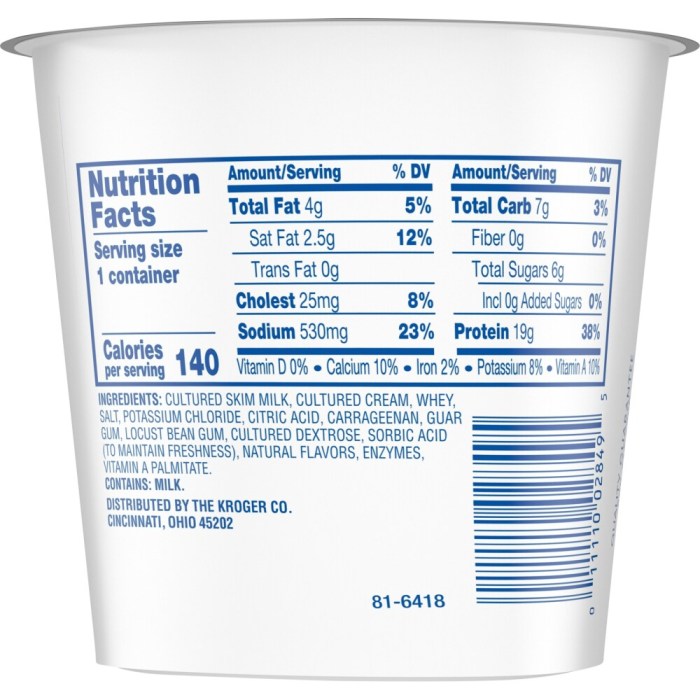Nutritional Profile of Low-Fat Cottage Cheese

Low fat cottage cheese nutrition facts – Low-fat cottage cheese offers a compelling nutritional package, making it a popular choice for health-conscious individuals. Its versatility, mild flavor, and high protein content contribute to its widespread appeal. Let’s delve into the specifics of its nutritional profile.
Macronutrient Composition of Low-Fat Cottage Cheese
A typical serving of low-fat cottage cheese (around 1 cup or 225g) provides a balanced mix of macronutrients. The precise values can vary slightly depending on the brand and manufacturing process, but the following table represents a reasonable average.
Yo, so low-fat cottage cheese? It’s, like, surprisingly good for you, right? But if you’re craving that cheesy goodness, check out the mac and cheese nutrition info – major calorie bomb, but hey, sometimes you gotta treat yourself. Then, get back to that low-fat cottage cheese for a healthier balance, you know? It’s all about that equilibrium, fam.
| Nutrient | Amount per Serving | % Daily Value | Unit |
|---|---|---|---|
| Protein | 28g | 56% | grams |
| Fat | 2g | 3% | grams |
| Carbohydrates | 6g | 2% | grams |
It’s important to note that the low-fat version significantly reduces the fat content compared to its full-fat counterpart, making it a suitable option for individuals managing their fat intake.
Vitamin and Mineral Content of Low-Fat Cottage Cheese
Low-fat cottage cheese is a good source of several essential vitamins and minerals that play crucial roles in maintaining overall health. These nutrients contribute to various bodily functions, from bone health to immune function.Low-fat cottage cheese is a valuable source of:
- Calcium: Essential for strong bones and teeth, muscle function, and nerve transmission.
- Riboflavin (Vitamin B2): Plays a critical role in energy metabolism and maintaining healthy skin.
- Vitamin B12: Crucial for nerve function, red blood cell formation, and DNA synthesis.
- Phosphorus: Important for bone health, energy production, and cell signaling.
- Selenium: An antioxidant that protects cells from damage and supports thyroid function.
Comparison of Low-Fat Cottage Cheese with Other Dairy Products
Comparing low-fat cottage cheese to other dairy products helps illustrate its unique nutritional profile within the broader context of dairy consumption. The following table highlights key differences:
| Nutrient | Low-Fat Cottage Cheese (1 cup) | Full-Fat Cottage Cheese (1 cup) | Plain Greek Yogurt (1 cup) | Whole Milk (1 cup) |
|---|---|---|---|---|
| Protein (g) | 28 | 25-30 | 20-25 | 8 |
| Fat (g) | 2 | 10-12 | 5-10 | 8 |
| Carbohydrates (g) | 6 | 6-8 | 10-15 | 12 |
| Calcium (mg) | 200-300 | 200-300 | 200-300 | 300 |
Note that these values are approximate and can vary based on the specific brand and serving size. The table demonstrates that low-fat cottage cheese offers a higher protein content compared to milk, while having significantly less fat than full-fat cottage cheese and often less than Greek yogurt. The carbohydrate content is relatively low across all products.
Potential Drawbacks and Considerations: Low Fat Cottage Cheese Nutrition Facts

While low-fat cottage cheese offers numerous nutritional benefits, it’s crucial to acknowledge potential drawbacks and make informed choices to maximize its health advantages. Understanding these aspects allows for responsible integration into a balanced diet, avoiding potential pitfalls. This section will explore some key considerations regarding the consumption of low-fat cottage cheese.Low-fat cottage cheese, while boasting a lower calorie and fat count compared to its full-fat counterpart, may result in lower satiety.
The fat content in food contributes significantly to feelings of fullness. Reducing fat can mean a reduction in this satiating effect, potentially leading to increased hunger and a greater likelihood of overeating later in the day. This is particularly relevant for individuals aiming to manage their weight or maintain a calorie deficit. The difference in satiety might be subtle for some, while others might experience a noticeable impact.
Individual responses vary considerably.
Satiety and Full-Fat Alternatives, Low fat cottage cheese nutrition facts
The reduced satiety associated with low-fat cottage cheese is a direct consequence of the removal of fat. Fat slows down digestion and promotes the release of hormones that signal fullness to the brain. Full-fat cottage cheese, containing a higher fat content, therefore generally leads to a more prolonged feeling of satiety. This doesn’t necessarily mean full-fat is always superior; it highlights the trade-off between reduced calories and potential increased hunger.
Individuals should consider their individual needs and metabolic responses when choosing between low-fat and full-fat options. For example, someone with a higher metabolism might not experience a significant difference, whereas someone with a slower metabolism might find the lower satiety more noticeable.
Additives and Processing
Another important consideration is the potential presence of additives in commercially produced low-fat cottage cheese. Manufacturers may add stabilizers, thickeners, or other ingredients to improve texture, shelf life, or overall taste. While many of these additives are generally recognized as safe, some individuals may have sensitivities or preferences for minimally processed foods. Reading food labels carefully and selecting brands with shorter ingredient lists and minimal added ingredients is crucial for those prioritizing cleaner eating.
For instance, choosing cottage cheese with only milk, cultures, and perhaps salt as ingredients minimizes exposure to potentially unnecessary additives.
Guidelines for Responsible Consumption
Responsible consumption of low-fat cottage cheese involves integrating it into a balanced diet and considering individual needs. Pairing it with higher-fiber foods, such as fruits or vegetables, can help to enhance satiety and create a more balanced and satisfying meal. For example, combining low-fat cottage cheese with berries and a sprinkle of nuts provides a protein-rich, fiber-rich, and satisfying breakfast option.
Additionally, paying attention to portion sizes and avoiding overconsumption, even of a healthy food like low-fat cottage cheese, is crucial for maintaining a healthy weight and preventing potential nutrient imbalances. Regular physical activity remains a cornerstone of overall health and complements the nutritional benefits of low-fat cottage cheese.
Popular Questions
Is low-fat cottage cheese good for people with lactose intolerance?
While generally lower in lactose than full-fat versions, it may still cause digestive issues for some individuals with severe lactose intolerance. Consider lactose-free options or smaller portions.
How long can low-fat cottage cheese be stored in the refrigerator?
Typically, low-fat cottage cheese stored in its original container will last for 7-10 days in the refrigerator after opening. Check the “best by” date on the packaging.
Can I freeze low-fat cottage cheese?
Yes, but its texture might change upon thawing. It’s best used in cooked dishes or smoothies after freezing.
Does low-fat cottage cheese contain added sugar?
Some brands may contain added sugar; always check the nutrition label. Plain, unsweetened varieties are generally preferred for health-conscious individuals.



